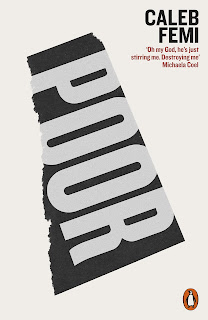Poetry - Poor
Tony Cross is reading all the books and poems shortlisted for this year's Forward Prizes for Poetry. Here are his thoughts on Poor, the debut collection by Caleb Femi...
As I was reading this brilliant debut collection, I found myself thinking of Anna Akhmatova, which may be a surprise to everyone who has read this collection. But I was thinking particularly of those famous lines in Requiem:
“And can you describe this?”
And I answered:
“Yes, I can.”
She is talking about Stalinist terror, but Caleb Femi's collection is talking about the black London experience. The collection even ends with an echo of Akhmatova:
"...& if you wish me to speak
I will." (Concrete V (Second Anniversary), p131
I had an advantage here of both having a paperback and audiobook of this collection, which I think is a fantastic way to sink into a poetry collection. The audiobook is fantastic. Indeed, they do interesting things with the sound engineering with the audiobook in the same way that the paperback is a little different to most poetry collections, including as it does photographs. It's also interesting to note the slight differences between the written versions and the audiobook. The words, the photographs and the audiobook when combined create something interesting and immersive. I recommend that if you can afford it.
These are powerful poems of modern London. A London that I don't experience myself. Indeed, part of the collection's theme seems to be how life of black Londoners is viewed by the press, the police, and other Londoners. I found myself - as a comfortable middle-class white man - questioning my own thinking. I can't live the experience of black Londoners and to pretend I can would be insulting and arrogant. I don't think that Caleb Femi's objective is to make us understand it. That might be a side effect of what he's doing. I think this is a book of elegiac witness. It is saying "this is our experience and I bear witness to it and now I have done that you cannot pretend you do not know."
I can't know for sure. Should Caleb Femi read this he might just think I've missed the point in an obvious way, but I do think this collection is here to give a voice to people whose voices are silenced or distorted - a good example is “Schrodinger's Black”, which is about Mark Duggan.
I can't emphasise enough how good this collection is. There were so many moments where I found myself stopping to think about what I'd just read because it had got under my skin. It's a collection that makes you feel as well as think though.
I've already mentioned one other poet, Anna Akhmatova, but this collection also reminded of something Ilya Kaminsky wrote in Deaf Republic:
“At the trial of God, we will ask: why did you allow all this?
And the answer will be an echo: why did you allow all this?”
I think this is an essential read and I expect it to be on the national curriculum at some point, if it isn’t already.
Follow Tony on Twitter @Lokster71
About The Forward Prizes
The Forward Prizes are a celebration for those who love contemporary poetry, in association with the Forward Arts Foundation. The winners of this year's prizes will be announced at a ceremony on 24th October. Here are the shortlists:
The 2021 Forward Prize for Best Collection
Kayo Chingonyi – A Blood Condition (Chatto & Windus)
Tishani Doshi – A God at the Door (Bloodaxe Books)
Selima Hill – Men Who Feed Pigeons (Bloodaxe Books)
Luke Kennard – Notes on the Sonnets (Penned in the Margins)
Stephen Sexton – Cheryl’s Destinies (Penguin Poetry)
The 2021 Felix Dennis Prize for Best First Collection
Caleb Femi – Poor (Penguin Poetry)
Alice Hiller – bird of winter (Pavillion Poetry)
Cynthia Miller – Honorifics (Nine Arches Press)
Holly Pester – Comic Timing (Granta Poetry)
Ralf Webb – Rotten Days in Late Summer (Penguin Poetry)
The 2021 Forward Prize for Best Single Poem
Fiona Benson – ‘Androgeus’ (Times Literary Supplement)
Natalie Linh Bolderstone – ‘Middle Name with Diacritics’ (National Poetry Competition)
John McCullough – ‘Flower of Sulphur’ (Poetry London)
Denise Riley – ‘1948’ (Poetry Ireland Review)
Nicole Sealey – ‘Pages 22-29, an excerpt from The Ferguson Report: An Erasure’ (Poetry London)
Image - Amazon
The Forward Prizes are a celebration for those who love contemporary poetry, in association with the Forward Arts Foundation. The winners of this year's prizes will be announced at a ceremony on 24th October. Here are the shortlists:
The 2021 Forward Prize for Best Collection
Kayo Chingonyi – A Blood Condition (Chatto & Windus)
Tishani Doshi – A God at the Door (Bloodaxe Books)
Selima Hill – Men Who Feed Pigeons (Bloodaxe Books)
Luke Kennard – Notes on the Sonnets (Penned in the Margins)
Stephen Sexton – Cheryl’s Destinies (Penguin Poetry)
The 2021 Felix Dennis Prize for Best First Collection
Caleb Femi – Poor (Penguin Poetry)
Alice Hiller – bird of winter (Pavillion Poetry)
Cynthia Miller – Honorifics (Nine Arches Press)
Holly Pester – Comic Timing (Granta Poetry)
Ralf Webb – Rotten Days in Late Summer (Penguin Poetry)
The 2021 Forward Prize for Best Single Poem
Fiona Benson – ‘Androgeus’ (Times Literary Supplement)
Natalie Linh Bolderstone – ‘Middle Name with Diacritics’ (National Poetry Competition)
John McCullough – ‘Flower of Sulphur’ (Poetry London)
Denise Riley – ‘1948’ (Poetry Ireland Review)
Nicole Sealey – ‘Pages 22-29, an excerpt from The Ferguson Report: An Erasure’ (Poetry London)
Image - Amazon






Post a Comment